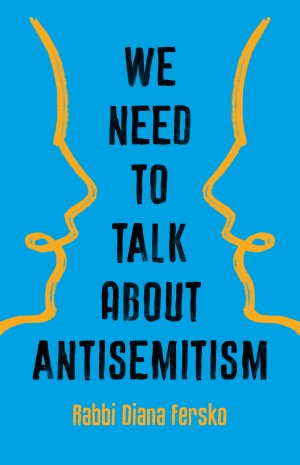Over the past few years, many books have addressed the rise of antisemitism in the US — so any text on the subject that wants to set itself apart must have a fresh take. We Need to Talk About Antisemitism is such a book. Writing in a conversational, sometimes snarky style, Diana Fersko offers new insights about antisemitism, challenging readers to name and fight it whenever it arises.
Fersko is a young congregational rabbi in New York City, and her position brings her into conversation with many congregants who are dealing with antisemitism in their own lives. For this reason, Fersko does not begin her book with the great problems of rising hatred on the Left and Right — though she does get there — but rather with the subtle, everyday microaggressions she sees all the time. These examinations are perhaps the most unique feature of the book. While other authors take on the biggest questions of antisemitism first, Fersko understands that the things that keep Jews up at night are often the personal and subtle jabs they field every day. These range from comments about how Jews look and behave to playground comparisons between Christmas and Hanukkah that her religious-school students might face.
When examining a topic, Fersko almost always contextualizes it with a personal example, citing a story about a time she faced antisemitism or helped someone else navigate it. In one moving appendix to the book, she interviews a Holocaust survivor; and in another, she examines how the memory of the Holocaust affects a few grandchildren of survivors.
This book does not pull punches. Fersko critiques everyone, from anti-Zionist activists on the Left to white supremacists and Christian supersessionism on the Right. She also carefully describes the steps that antisemites might take to find absolution, explaining how we know when it’s time to forgive them and when we should move on.
One particularly important sentiment that extends throughout the book is that Jews should be able to talk about their Judaism on their own terms. Fersko believes that antisemitism exists when society speaks for Jews rather than with them: when it denies that Jews are anything but a religion, when it universalizes the Holocaust, and when it engages in tokenization. On nearly every page, Fersko celebrates the diversity, breadth, and vivacity of the Jewish experience. She believes that only when Jews demand to set the terms of what it means to live Jewishly will they have a fighting chance at actually addressing rising antisemitism.
For Fersko, the biggest problem facing Jews today is that not enough of us are willing to talk about antisemitism with candor and courage. Her title, We Need to Talk About Antisemitism, is a challenge to all of us. Acknowledging how hard it can be to have these kinds of uncomfortable, frank conversations, Fersko implores her readers to begin tackling these issues through individual dialogue, and to “afflict the comfortable.”
Rabbi Marc Katz is the Rabbi at Temple Ner Tamid in Bloomfield, NJ. He is author of the books Yochanan’s Gamble: Judaism’s Pragmatic Approach to Life (JPS) chosen as a finalist for the PROSE award and The Heart of Loneliness: How Jewish Wisdom Can Help You Cope and Find Comfort (Turner Publishing) which was chosen as a finalist for the National Jewish Book Award.





